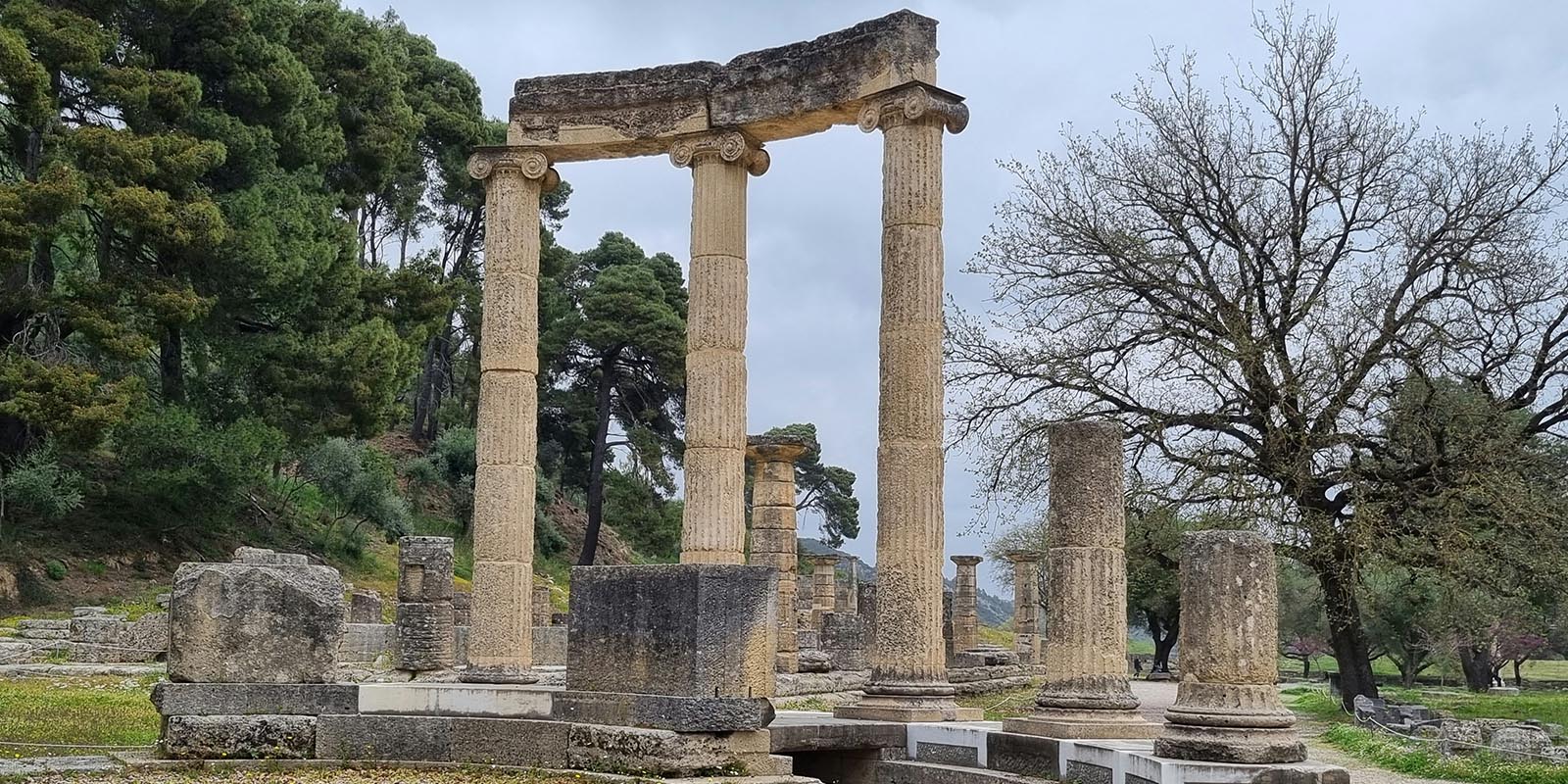

Olympia, located in the western part of the Peloponnese peninsula, was the site of the ancient Olympic Games, the most famous athletic competition in the ancient world. Dedicated to Zeus, the father of the gods, Olympia was a sacred sanctuary and a symbol of Greek unity and pride.
Athletic Competitions:The Olympic Games, held every four years, brought together athletes from Greek city-states and beyond to compete in various athletic disciplines, including running, wrestling, boxing, and chariot racing. Winners were revered as heroes and awarded olive wreaths.
Panhellenic Festival: The Olympics were part of a larger religious festival honoring Zeus and other Olympian gods. The festival included sacrifices, processions, and cultural events, fostering a sense of unity among Greeks and promoting peace during the Olympic truce.
Stadium and Gymnasium: The stadium at Olympia, with its sloping embankments and starting line marked by stone blocks, was the venue for foot races, while the gymnasium served as a training ground for athletes to prepare for competition.
Religious Sanctuary:Temple of Zeus: The centerpiece of Olympia was the Temple of Zeus, one of the largest temples in ancient Greece. It housed a monumental gold and ivory statue of Zeus, sculpted by Phidias, which was counted among the Seven Wonders of the Ancient World.
Altar of Hera: Adjacent to the Temple of Zeus was the Altar of Hera, where the Olympic flame was lit during the games. Hera, Zeus's wife, was honored alongside him, symbolizing the sacred bond between husband and wife in Greek mythology.
Statue of Nike: Another notable monument at Olympia was the Statue of Nike, the goddess of victory, erected to commemorate the Athenian victory over the Persians at the Battle of Marathon. This statue embodied the spirit of triumph and excellence celebrated at the Olympics.
Historical Significance:Celebration of Excellence: The Olympics celebrated physical prowess, sportsmanship, and the pursuit of excellence, reflecting Greek ideals of arete (excellence) and agon (competition). The games provided athletes with opportunities for glory and fame, while also promoting cultural exchange and camaraderie.
Cultural Legacy: Olympia's influence extended beyond athletics to art, politics, and philosophy. It served as a meeting place for intellectuals, philosophers, and politicians, fostering intellectual exchange and debate.
Endurance and Revival: Despite periods of decline and abandonment, Olympia's legacy endured through the ages. The site was rediscovered and excavated in the 19th century, leading to its recognition as a UNESCO World Heritage Site and the revival of the modern Olympic Games in 1896.
Enduring Legacy:Symbol of Olympism: Olympia's legacy lives on in the modern Olympic Games, which continue to promote peace, friendship, and international cooperation through sport. The Olympic flame, ignited at Olympia and carried to the host city, symbolizes the enduring spirit of the games.
Global Inspiration: Olympia's ideals of fair play, unity, and human excellence inspire athletes and spectators worldwide. The games serve as a platform for athletes to showcase their talents, break barriers, and foster mutual respect and understanding.
Pilgrimage Site: Olympia remains a pilgrimage site for sports enthusiasts, historians, and cultural enthusiasts, offering a glimpse into the ancient world and the origins of the Olympic movement.
Olympia, with its rich history and cultural significance, continues to inspire awe and admiration as a symbol of human achievement and the enduring spirit of Olympism.
| Location | 37.6385° N, 21.6291° E |
|---|

Did you know? The Olympic Games originated in Olympia in 776 BCE and were held every four years for over a millennium.
Ancient Greek art and architecture, with its harmonious proportions and timeless elegance, continue to inspire awe and admiration millennia later.
Discover
Greek mythology, a rich tapestry of gods, heroes, and mythical creatures, captivates the imagination with its tales of love, betrayal, and epic adventures that delve into the depths of the human psyche.
Discover
Ancient Greek history, marked by remarkable achievements in democracy, philosophy, and warfare, shaped the foundation of Western civilization, leaving an indelible legacy of innovation and cultural influence that continues to resonate to this day.
Discover
The ancient Greek Olympics, held in Olympia every four years, celebrated athleticism, unity, and cultural pride, serving as a testament to the enduring spirit of competition and excellence that transcends time and borders.
Discover
Ancient Greek wars, such as the Persian Wars and the Peloponnesian War, were pivotal conflicts that shaped the course of history, highlighting the struggle for power, independence, and the clash of civilizations in the ancient Mediterranean world.
Discover
Ancient Greek culture and society, characterized by its emphasis on art, philosophy, and civic engagement, fostered a vibrant intellectual and social landscape where innovation flourished, democracy thrived, and the pursuit of knowledge and excellence was celebrated as fundamental values of civilized life.
Discover
Find out more about ancientgreece.com